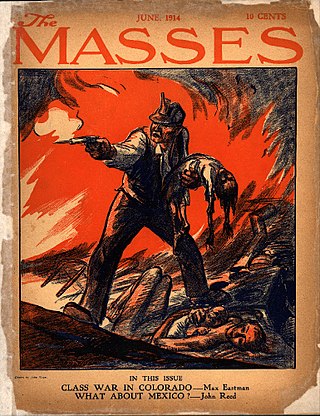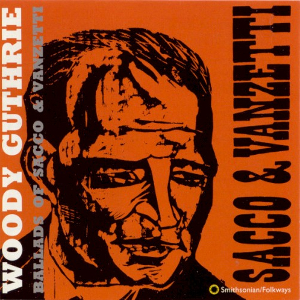
Woodrow Wilson Guthrie was an American singer-songwriter, one of the most significant figures in American folk music. His work focused on themes of American socialism and anti-fascism. He inspired several generations both politically and musically with songs such as "This Land Is Your Land", written in response to the American exceptionalist song "God Bless America".

Nicola Sacco and Bartolomeo Vanzetti were Italian immigrant anarchists who were controversially accused of murdering Alessandro Berardelli and Frederick Parmenter, a guard and a paymaster, during the April 15, 1920, armed robbery of the Slater and Morrill Shoe Company in Braintree, Massachusetts, United States. Seven years later, they were executed in the electric chair at Charlestown State Prison.
The Almanac Singers was an American New York City-based folk music group, active between 1940 and 1943, founded by Millard Lampell, Lee Hays, Pete Seeger, and Woody Guthrie. The group specialized in topical songs, mostly songs advocating an anti-war, anti-racism and pro-union philosophy. They were part of the Popular Front, an alliance of liberals and leftists, including the Communist Party USA, who had vowed to put aside their differences in order to fight fascism and promote racial and religious inclusiveness and workers' rights. The Almanac Singers felt strongly that songs could help achieve these goals.

"This Land Is Your Land" is one of the United States' most famous folk songs. Its lyrics were written by American folk singer Woody Guthrie in 1940 in critical response to Irving Berlin's "God Bless America", with melody based on a Carter Family tune called "When the World's on Fire". When Guthrie was tired of hearing Kate Smith sing "God Bless America" on the radio in the late 1930s, he sarcastically called his song "God Blessed America for Me" before renaming it "This Land Is Your Land".

Gilbert Vandine "Cisco" Houston was an American folk singer and songwriter, who is closely associated with Woody Guthrie due to their extensive history of recording together.

Ramblin' Jack Elliott is an American folk singer and songwriter.
"Deportee (Plane Wreck at Los Gatos)" is a protest song with lyrics by Woody Guthrie and music by Martin Hoffman detailing the January 28, 1948 crash of a plane near Los Gatos Canyon, 20 miles (32 km) west of Coalinga in Fresno County, California, United States. The crash occurred in Los Gatos Canyon and not in the town of Los Gatos itself, which is in Santa Clara County, approximately 150 miles away. Guthrie was inspired to write the song by what he considered the racist mistreatment of the passengers before and after the accident. The crash resulted in the deaths of 32 people, 4 Americans and 28 migrant farm workers who were being deported from California back to Mexico.

Dust Bowl Ballads is an album by American folk singer Woody Guthrie. It was released by Victor Records, in 1940. All the songs on the album deal with the Dust Bowl and its effects on the country and its people. It is considered to be one of the first concept albums. It was Guthrie's first commercial recording and the most successful album of his career.
Smithsonian Folkways is the nonprofit record label of the Smithsonian Institution. It is a part of the Smithsonian's Smithsonian Center for Folklife and Cultural Heritage, located at Capital Gallery in downtown Washington, D.C. The label was founded in 1987 after the family of Moses Asch, founder of Folkways Records, donated the entire Folkways Records label to the Smithsonian. The donation was made on the condition that the Institution continue Asch's policy that each of the more than 2,000 albums of Folkways Records remain in print forever, regardless of sales. Since then, the label has expanded on Asch's vision of documenting the sounds of the world, adding six other record labels to the collection, as well as releasing over 300 new recordings. Some well-known artists have contributed to the Smithsonian Folkways collection, including Pete Seeger, Ella Jenkins, Woody Guthrie, and Lead Belly. Famous songs include "This Land Is Your Land", "Goodnight, Irene", and "Midnight Special". Due to the unique nature of its recordings, which include an extensive collection of traditional American music, children's music, and international music, Smithsonian Folkways has become an important collection to the musical community, especially to ethnomusicologists, who utilize the recordings of "people's music" from all over the world.
Marjorie Greenblatt Guthrie, who used Marjorie Mazia as her professional name, was a dancer, dance teacher, and health science activist. She was married to folk musician Woody Guthrie. Her children with him include folk musician Arlo Guthrie and Woody Guthrie Publications president Nora Guthrie.

American singer-songwriter Woody Guthrie's published recordings are culled from a series of recording sessions in the 1940s and 1950s. At the time they were recorded they were not set down for a particular album, so are found over several albums not necessarily in chronological order. The more detailed section on recording sessions lists the song by recording date.
"On the Trail of the Buffalo", also known as "The Buffalo Skinners" or "The Hills of Mexico", is a traditional American folk song in the western music genre. It tells the story of an 1873 buffalo hunt on the southern plains. According to Fannie Eckstorm, 1873 is correct, as the year that professional buffalo hunters from Dodge City first entered the northern part of the Texas panhandle. It is thought to be based on the song Canaday-I-O.

"Ludlow Massacre" is a song by Woody Guthrie about the Ludlow Massacre, a labor conflict in Ludlow, Colorado, in 1914. A related song is the "1913 Massacre".
"1913 Massacre" is a topical ballad written by Woody Guthrie, and recorded and released in 1945 for Moses Asch's Folkways label. The song originally appeared on Struggle, an album of labor songs. It was re-released in 1998 on Hard Travelin', The Asch Recordings, Vol.3 and other albums. The song is about the death of striking copper miners and their families in Calumet, Michigan, on Christmas Eve, 1913, in what is commonly known as the Italian Hall disaster.

The Asch Recordings, recorded between 1944 and 1949, are a series of albums featuring some of the most famous recordings of US folk musician Woody Guthrie. The recordings were recorded by Moses "Moe" Asch in New York City. The songs recorded by Asch comprise the bulk of Guthrie's original material and several traditional songs. They were issued on a variety of labels over the years under the labels Asch, Asch-Stinson, Asch-Signature-Stinson, Disc, Folkways and Smithsonian Folkways. The tracks for Guthrie's Songs to Grow on for Mother and Child and Nursery Days were from these sessions.

The Union Boys was an American folk music group, formed impromptu in 1944, to record several songs on an album called Songs for Victory: Music for Political Action. Its "all-star leftist" members were Josh White, Sonny Terry, Brownie McGhee, Pete Seeger, Burl Ives, Tom Glazer.
Moses Asch was an American recording engineer and record executive. He founded Asch Records, which then changed its name to Folkways Records when the label transitioned from 78 RPM recordings to LP records. Asch ran the Folkways label from 1948 until his death in 1986. Folkways was very influential in bringing folk music into the American cultural mainstream. Some of America's greatest folk songs were originally recorded for Asch, including "This Land Is Your Land" by Woody Guthrie and "Goodnight Irene" by Lead Belly. Asch sold many commercial recordings to Verve Records; after his death, Asch's archive of ethnic recordings was acquired by the Smithsonian Institution, and released as Smithsonian Folkways Records.
Stinson Records was an American record label formed by Herbert Harris and Irving Prosky in 1939, initially to market, in the US, recordings made in the Soviet Union. Between the 1940s and 1960s, it mainly issued recordings of American folk and blues musicians, including Woody Guthrie and Josh White.
Jeff Place is the Grammy-award-winning Archivist and Curator at the Smithsonian Center for Folklife and Cultural Heritage. He and Anthony Seeger were the first two full-time employees hired in 1987 when the Smithsonian acquired Folkways Records from the estate of Folkways founder Moses Asch.
"Riding in My Car" is a children's song by Woody Guthrie.








